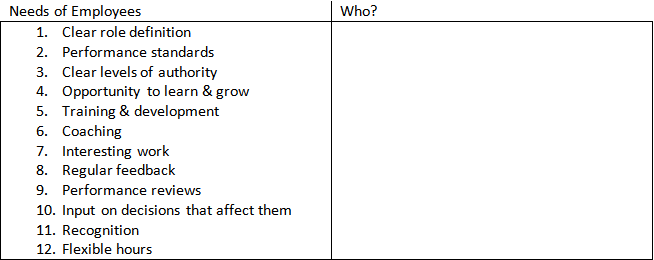Leaders expect employees to meet certain performance expectations and most employees want to them. But often there is a gap between expected and actual performance.
 What are the needs of employees that must be met in order for them to do their jobs as expected? Here is an exercise that I have done often with leaders to bring awareness to this issue. You can conduct this exercise in your organization and then take action.
What are the needs of employees that must be met in order for them to do their jobs as expected? Here is an exercise that I have done often with leaders to bring awareness to this issue. You can conduct this exercise in your organization and then take action.
On a flip chart draw a T and on the left side list the needs of employees. Conduct a brainstorm session with your co-leaders or managers or do this on your own. Doing it as a team is more effective and brings everyone on the same page. You can also just work with my list below to get going right now.
Some items could be:

Once you have the list, review who must or can fill these needs. You can also assess how well these needs are being met. This could vary by team as some managers may be doing a better job than others in filling these needs.
An interesting twist is to have the employees go through the same exercise as a team without the managers’ presence. You can then compare the two lists. However, do this only if you are sure to take action on at least one item that needs attention.
Another option is to have the managers evaluate their own needs. Many items would be the same but there might be some additional items like involvement in company strategic direction decisions.
Once you have your list determine the top three priorities and then set an action plan to address the most important or easiest to improve.
I always like to go deeper and ask the question, what would stop you from implementing your action plan on this one item? Usually there are two main obstacles; habit and a personal tendency related to the type of the person. I will get into these issues in future articles and videos.
______________________________________________________________________________________
How well do you know yourself and others? Socrates is famous for the two words know thyself. Having a better understanding of yourself and others is the key to being more effective as a leader and to work well in teams. The book CrazYZoo, Know-Thyself Made Easy by Fritz Glaus guides you step by step in discovering your classic type of person. Fritz does this as he tells the story about zoo animals who must learn to collaborate together in order to create an open zoo that is safe and peaceful, so humans could be closer to the animals.

Throughout the book, which is written as a fable, Fritz demonstrates how the different types of animals use mututal coaching techniques to help each other overcome their fears, which act as restrainers in leadership and teamwork.
We all belong to a classic type that is usually combined with another closely related type pf person. This book will clarify the qualities and fears of each type and provide deep understanding of how best to deal with the problems caused by the fear of each type.
Fritz had also integrated his types of people approach into his Style of Leadership and Team Develop and My Team & I and training programs, which we are pleased to have delivered to many organizations and still offer today.
Fritz is no long with us but his voice and spirit live on in his work. I encourage you to purchase his book and partake in the exercises to discover your classic and combined types. I am certain you will find this eye opening and will provide you with tools to become more balanced and more effective with others.

Stephen Goldberg







